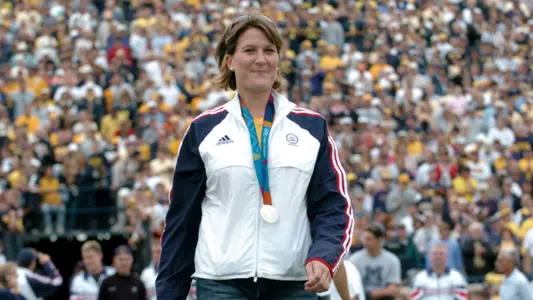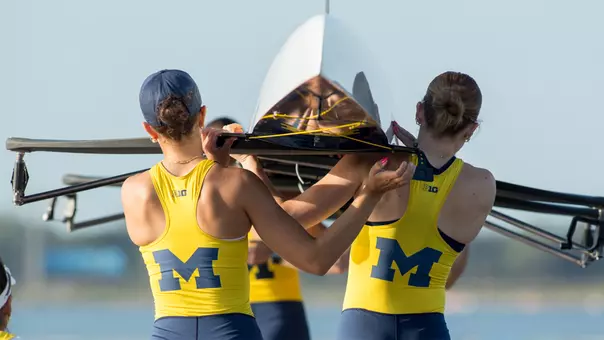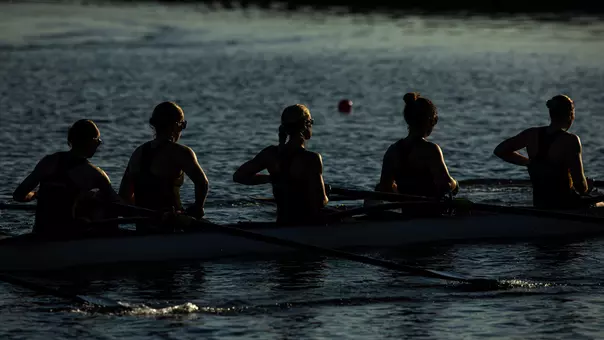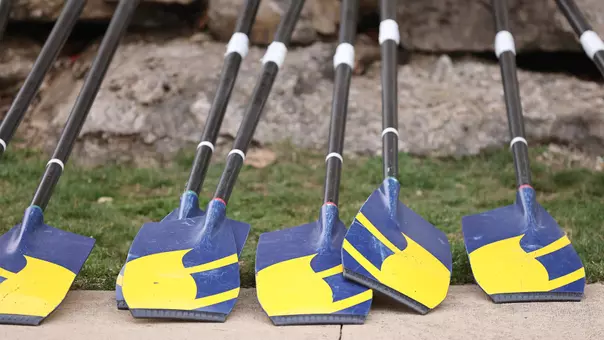
Five Questions: Kate Johnson
8/1/2008 12:00:00 AM | Rowing, Features, Olympics
Seven years after graduating from Michigan, Kate Johnson (1998-2001) is still the most prominent student-athlete to hail from the 12-year-old U-M women's rowing program. She is U-M's only three-time All-America honoree, collecting first-team accolades in 1999, 2000 and 2001. She was also the Big Ten Rower of the Year in 2000 and 2001. Following her career in Ann Arbor, Johnson jumped right into Team USA's eight, where she rowed in three consecutive FISA World Rowing Championships. Her American crew won gold at the 2002 FISA World Championships. However, her crowning athletic achievement came in 2004 when she represented the U.S. at the Athens Olympics. After winning its opening heat, the U.S. eight went on to capture the silver medal, trailing only Romania on the medal stand. While Johnson won't call herself retired, she has moved into the business world and works for marketing/media giant IMG in New York City. She is heading to the 2008 Beijing Olympics as a consultant for the company's Olympic clients and looks forward to experiencing the Olympics from a different perspective.
Q: What did it mean to you to be named an Olympian for the 2004 Games in Athens? How did the feeling compare to being picked for the 2002 or 2003 U.S. National Teams?
I was 15 years old and had just started rowing as a high school freshman when I made up my mind to one day compete in the Olympics for rowing. Twelve years and a ton of work later I made the 2004 Olympic Team and could at last call myself an Olympian. I will never forget what went into that journey. Becoming an Olympian and competing at the Athens 2004 Olympic Games was everything I'd dreamed. All of the races and events I competed in across the years added up to making it to the Olympics. From winning the World Championships in 2002 to finishing second at NCAAs at Michigan, all of my successes and failures were integral in making the Olympic Team. The day I made the Olympic Team, I went back to my journal from when I was 15 years old and put a huge check mark over the line where I had written 12 years earlier: 'My dream is to one day compete in the Olympic Games' ... checking that off was an incredible feeling.
Q: What do you remember about the final race from the 2004 Games? Is it a blur or do you remember every stroke you took? What was your immediate thought when the race came to an end?
I remember what it felt like to sit on the starting line ... the rest is basically a blur. I was overwhelmed at the end of the race. We had our hearts set on gold but when you cross a finish line knowing that you had nothing left to give, you have to balance that with your expectations. On the medals stand when our flag began to rise on the flag pole I was completely overcome. I dug my nails into my fist and tried to make myself more alert. I kept thinking 'this is it; this is the moment you've dreamed about.' It was incredible. My favorite feeling was hugging my teammates and then my family when it was all over. That and having my Olympic silver medal placed around my neck!
Q: Looking back one week, one year, four years later what does the accomplishment of winning an Olympic silver medal mean to you?
I don't think any athlete can do what we do, commit the hours, the passion and emotional energy it takes to succeed without enjoying the journey. Now that I have transitioned from athlete to Olympian I carry with me what it took to get there into my everyday life. I had a very real understanding after winning the silver medal that I could succeed at whatever I put my mind to. I think that's how my Olympic journey stays a part of my daily life. Every day I hold myself to the same standard that it took to succeed at the Olympic level. It's a part of me, and it gives me a quiet confidence in my career and my everyday life.
Q: You and Kate MacKenzie were the first U-M alumnae to reach the Olympics. Are you proud to see that four U-M alumnae (USA: Brett Sickler, Ellen Tomek; Canada: Janine Hanson, Heather Mandoli) will be competing at the 2008 Games?
I am so excited for the athletes who will be competing in rowing in Beijing. They are incredibly talented and are continuing a strong tradition of Michigan alumnae in the Olympic Games. While Michigan rowers competing at the Olympic Games is still new, we join a long tradition of Michigan Olympians. It's been amazing to watch the success of Michigan rowing and the strength coming out of the men's and women's programs.
Q: How has life changed for you since retiring? Tell me about Right to Play and your marketing work with IMG.
I don't like to say that I've retired. That word is so final! The decision not to train for Beijing was something I had to do for myself. I was ready to grow in other ways and spend time and mental energy on other life endeavors. Working at IMG has really been incredible. I work in their Olympic Consulting division serving global partners of the Olympic Games. Specifically, I've been able to create an athlete program for one of our clients which is geared toward inspiring Beijing 2008 Olympians to give back. Our program is in partnership with Right To Play and our Olympic client. Right To Play uses sport as a tool for development in some of the most disadvantaged areas of the world. I traveled to Ethiopia with them in 2006 to work with their children's programs as an Athlete Ambassador.
For our program with Right To Play we will be operating out of the Athlete Village in Beijing. Our partnership includes a medal grant program that allows athletes who compete to have money donated back to Right To Play in their name if they win a medal. We also have created a fellowship program for athletes who want to gain invaluable work experience after the Games. We will send athletes into the areas of the world where Right To Play programs operate for two weeks. Once they have completed their field experience they will work out of one of RTP's national offices and learn how a non-government organization for sport operates.
I'm extremely passionate about this program because I think a lot of athletes struggle to stay connected to sport in meaningful ways when they are no longer competing. This program really is a tool for athletes as well as a tool to help children around the world.










